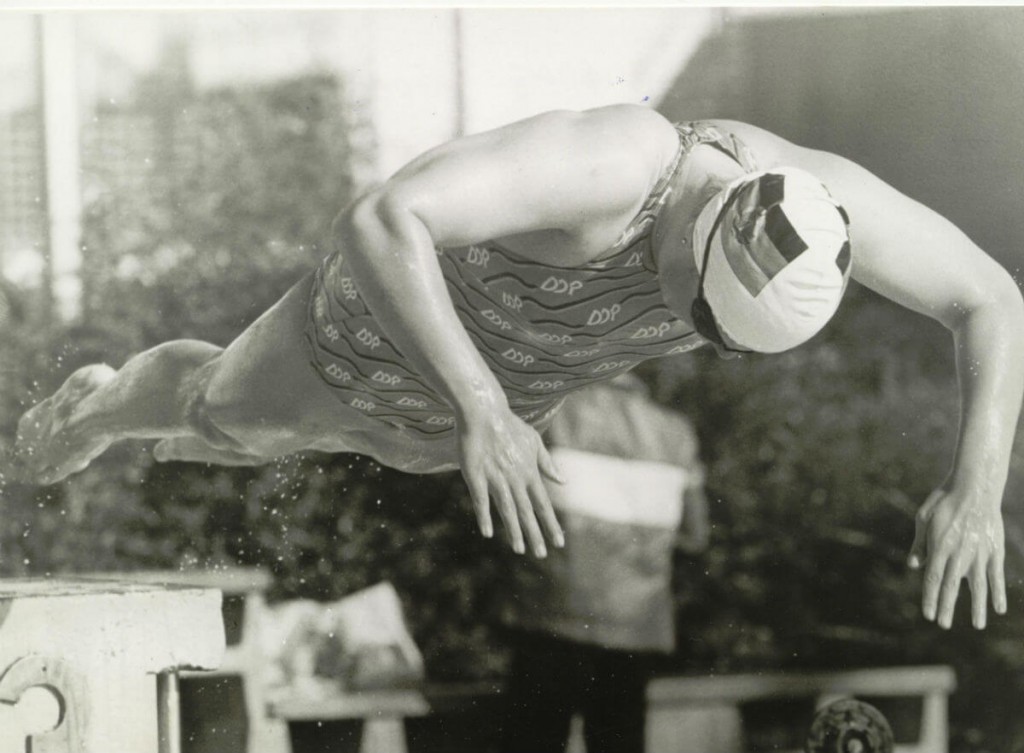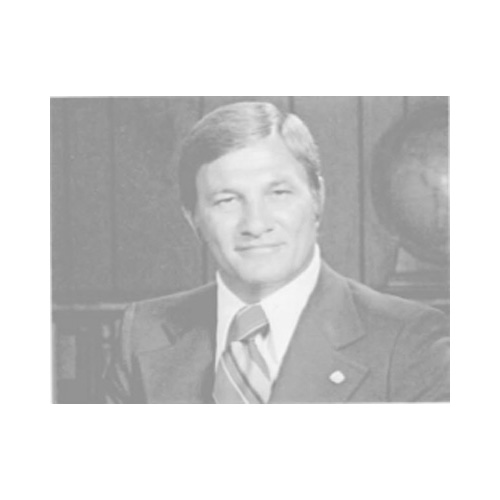Rare Audio Reliving 1976 USA Women’s 400 Free Relay “Last Gold” Victory Over East Germans

With all the buzz over USA Swimming’s Last Gold Documentary, Swimming World republished a rarely heard audio interview with Jack Nelson. Nelson, was a major force in coaching the American women to gold over the East Germans in the 400 free relay at the 1976 Olympics. He had a storied coaching career across four decades, his legacy is most lasting in that epic swim from Kim Peyton, Wendy Bogliogli, Jill Sterkel and Shirley Babashoff at the 1976 Games. The 400 free relay was the final event of the meet for the women, and the United States had come up empty in gold medals, losing nearly every race to the East Germans. Nelson passed away in 2014
Nelson, the head women’s Olympic coach, gave the four women an inspirational pep talk before the race, sizing each one up with their East German counterparts. In an interview with Swimming World Magazine Publisher Brent Rutemiller in 2007, Nelson spoke at length about getting the ladies ready for the race.

Photo Courtesy: Swimming World Magazine
Listen to Brent Rutemiller interview Jack Nelson, USA’s Head Women’s Swim Coach, as Nelson emotionally describes what unfolded when Kim Peyton, Wendy Boglioli, Jill Sterkel and Babashoff stepped up for that race. It is a classic underdog story in what history has deemed the greatest female relay race of all time.
Transcripts of the Interview
Brent Rutemiller: You’re listening to Swimming World Radio. I’m your host, Brent Rutemiller, and today we’re talking with Hall of Fame coach Jack Nelson. Coach Nelson was the head women’s Olympic coach for the 1976 Olympic Games in Montreal. Thanks for joining us today Coach Nelson.
Coach Jack Nelson: Hey, glad to hear from you and to know that you’re still chasing the beauty of girls in ’76.
Brent Rutemiller: Which brings us to the big news in the last month or so is the German Olympic Committee has awarded compensation to about 197 East German athletes for the systematic doping from 1973 through 1989. And Coach, I know that that has had a tremendous effect on that 1976 Olympics. Let’s talk a little bit about that.
Coach Jack Nelson: Well prior to the ’76 Olympics the East Germans had just blown us away in the world championships. And our girls were honestly bothered by the fact that they had been the greatest team in the world for a while and then suddenly the East Germans just are blowing us away.
Brent Rutemiller: Swimming World Magazine first reported in 1973 – now this is three years out from ’76 as you know – that something was going on and everybody was trying to find out what was so special about the East German training program. And in the article there was the first print mentioned that they were experimenting with some type of recovery or fatigue vaccine where they were injecting toxins and there also were some allegations to doping. And at the time that was the first time that it was really brought out that something kind of unusual was going on. Do you remember that period in ’73 which is some three years out now?
Coach Jack Nelson: Keep in mind that that might have been the first time that it was published but we knew but we just couldn’t prove it. We knew while we were there that they were beating up on us with steroids and whatever and there was nothing we could do about it, right? Plus we didn’t want to be the nasty Americans at the Olympics. And the girls they broke nine American records. They broke nine American records.
Brent Rutemiller: Wow.
Coach Jack Nelson: Yes. And also during that time of those nine there were four world records broken but not – it didn’t count because the East Germans had touched us out on all those potential world records. So the girls were doing well, they just weren’t winning. Do you know what I’m saying?
Brent Rutemiller: Yes.
Coach Jack Nelson: They were swimming all-American times and I was really proud of them for that and that’s when they would call – the press would call Shirley [Babashoff] in, it was terrible what they were doing, and said “Don’t you feel bad that you’re not winning?” Hey, that’s a young girl, she’s 17 years old, she’s a very outstanding swimmer for the United States of America, and so I just stopped them and I said “Look guys, if you’re going to speak about negatives here to an amateur swimmer against these professionals here” I said “I’m just going to walk her right out of here.”
Brent Rutemiller: Shirley Babashoff had the 100–could have had the 100 world record. At one point in time she traded the 200 world record free back and forth with Kornelia Ender. She had the 400 world record and then she lost that. And then she goes in to the Olympic trials and sets the world record in the 800 free and then loses that, all of them to the drug-induced Germans.
Coach Jack Nelson: Right.
Brent Rutemiller: Psychologically you as a coaching staff, the country, you’re seeing every time the East Germans set a new record we just push somehow past that record only to be surpassed again by the Germans. In that whole period of that psychological – what else do we have to do to secure the world record and the gold – it just has to be mind boggling during that time?
Coach Jack Nelson: I might be jumping here a little bit but we rode on the same bus from the dormitories as the East Germans and the East Germans were deep voice talking like this and they had hair all over their arms deep voice and like when we get into the Olympic pool Hattie comes flying out and says “Coach, there are men in the locker room” and I said “Honey, those aren’t men, those are women.” And so they had a lot to overcome, psychologically they had a lot to overcome.
Brent Rutemiller: Let’s talk about the media a little bit because Shirley spoke out and you already said that there was this air where you felt that you were kind of pinned in, you were muzzled, you couldn’t really say anything that was derogatory because you would have been tended poor sports people but Shirley said something and as a result she was branded by
Coach Jack Nelson: I mean that woman, that girl, that beautiful athlete was doing some fantastic swimming and no one would appreciate it, no one would get on and say “Hey lady, you are great” you know what I’m saying?
Brent Rutemiller: When did you – you had your suspicions – when did you feel you had solid proof?
Coach Jack Nelson: You know what’s sad is even though the girls were magnificent they – and by the way, even the ones that didn’t break American records broke their own records, you know what I’m saying? I mean they were great swimmers doing great jobs against some terrible cheaters. I’m so happy that Shirley’s talking to you. Do you follow me?
Brent Rutemiller: Yes.
Coach Jack Nelson: I’ve only seen her one time since the Olympics and that was when she came around the country and came to Fort Lauderdale, raising money for the Olympic trip to I think Korea. One thing that stands out in my mind is that we had a chance to win that 4×100 freestyle relay provided every one of our girls would do all their best times. And so almost to the day of the full week before the last event which was at the end of the week, I don’t remember exactly what day it was, but it was for the freestyle relay and we qualified, our girls qualified second and the Canadian girls qualified third. And we spent – we, the coaches and I – we spent time with the girls saying “Look, we can win this relay but it has to be done this way. Kim Peyton, you’re the American record holder, every time you get on the block you go faster than you’ve ever gone, so we’re going to lead you off the first 100 free as fast as you can go. Wendy [Boglioli], you’re going to go second and you’re going to try to catch [The Next Person] because Ender we knew that she was going to go first and we wanted Kim to go with Ender and do the best she could to put us in position to win totally. Anyway Kim her job is to be within a body’s length of the first 100 against Ender so on the start —
Brent Rutemiller: Now Kim’s best time was like 57.5 I think?
Coach Jack Nelson: Right. But she went 56.5 I believe in the lead-off leg. You with me?
Brent Rutemiller: Yes.
Coach Jack Nelson: Once again she broke the American record for the 100 free but she was one full length [back] on the touch from Ender. And we didn’t tell them they had to beat them, we told them they had to be within a body length and then Wendy’s job was to catch up. Wendy’s job was to catch up that one body length [from] Kim [whose swim broke] an American record had done. So Wendy takes off and drops two seconds in the fastest 100 of her life. She was like instead of a 57 swimmer she was a 55 swimmer in that relay, okay? Jill’s job then was to get Shirley the lead. Jill’s job was to get Shirley the lead.
Brent Rutemiller: That’s Jill Sterkel?
Coach Jack Nelson: Jill Sterkel, right. And Jill Sterkel did get Shirley the lead by going 55 plus herself. Now Kim’s gone her best time, Wendy’s gone her best time by two seconds.–
Brent Rutemiller: Jill best going into that was a 57 too.
Coach Jack Nelson: Right. And she came back with a 55.5, right?
Brent Rutemiller: Yes.
Coach Jack Nelson: Okay. And now Shirley she gets the lead on Jill’s touch, she gets the lead on Jill’s touch. [The] Germans claimed that she jumped but she did not because they show it on film that she did not, but it was a great start and Jill just blew them away with another 55 [to win].
There was just no way that [Shirley Babashoff] was going to lose that relay, there was just no way that we were going to lose it because she was getting sick and tired of those people burning her.
What was so outstanding was they won with their minds, they didn’t worry about the East Germans at this point, they were worried about America winning and they did and people went bonkers. And the thing about it is they were truly, truly great Americans during that relay and they had no fear, no fear at that point.
I honestly feel that if a man or a woman go their best time that that’s a plus. If the man or the woman beats an American record that’s a plus-plus, right? But we never got credit for that and we did have the girls ready to go on this relay. It wouldn’t have mattered what they do, they did about four seconds. Those poor girls – Kim, Wendy, Jill, and Shirley – they broke the world record by four seconds.
Brent Rutemiller: What was it like when you came back to the States?
Coach Jack Nelson: Oh, let me tell you what it was like even before we got back to the States. The coaches – and this is, I’m sorry about this – but a number of the coaches would look away when they saw me. They would look away because they themselves did not understand what these girls had achieved. They themselves didn’t recognize the fact that we had been cheated to the limits.
Brent Rutemiller: These are the United States coaches, or the German coaches?
Coach Jack Nelson: I think the German coachers were ashamed and in fact one told me later on at a World Cup swim meet that when the Chinese started playing the games he said “You know what they’re doing, don’t you?” I said “What’s that?” and he said “The same thing as the East Germans did.”
Brent Rutemiller: So what was it like when you came back to the States?
Coach Jack Nelson: It was sad because people couldn’t accept that when you break your best time of your like in the 100 by about two seconds and when four girls out of four girls all go their career best swim to beat it they just couldn’t accept the fact that the guys were beating everybody and our girls were not beating anybody. So I took the film of the relay, I took it around to all the people here in Fort Lauderdale, and people were in tears, they were so happy.
Brent Rutemiller: Coach, now that the German Olympic Committee is doing something to rectify what has happened from 1973 to 1989 in the East German Athletic Program what do you think should be done to bring this issue or to compensate those 1976 women?
Coach Jack Nelson: What a tough question, right? What a tough question because no way will we ever give them what they totally deserve but the Olympic Committee surely should give them gold medals for the events where they broke world records. You with me?
And the United States Women should give gold medals to the hundreds and the other events that broke American records. Now this in itself is not going to be the most wonderful thing that can happen for our girls but at least it will remind them that we care about them, that we appreciate them, that they were greater than the people that supposedly touched them out.
They were absolutely greater than the people who supposedly touched them out and in some way or another that has to be handled properly and realistically because it’s unfair, it’s unfair and it hurts so much that our great American girls had worked so beautifully to overcome what they were about to have to compete with and nobody – I shouldn’t say nobody – but very, very, very few people were willing to step forth and say “Good job, guys.” It’s something that should never ever be put aside.
Brent Rutemiller: Well I just want to thank you Coach now for spending some time with Swimming World Radio and appreciate everything you have to say and your perspective on this issue.
Coach Jack Nelson: Thank you so much, Brent, and keep up the good work.
Brent Rutemiller: Well, thank you. And this is Brent Rutemiller with Swimming World Radio reporting on swimming from around the world.




